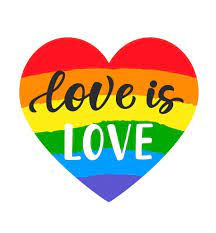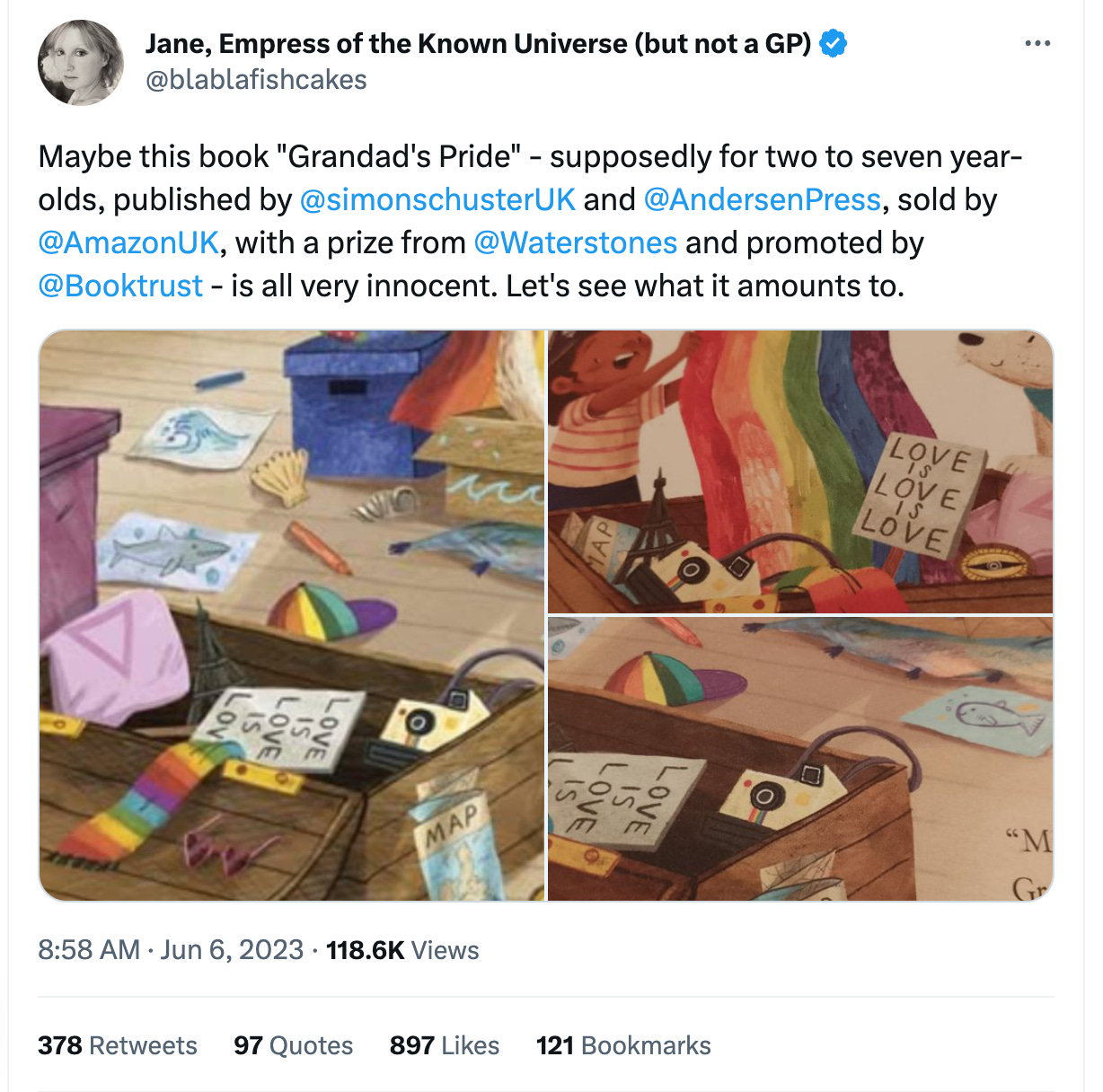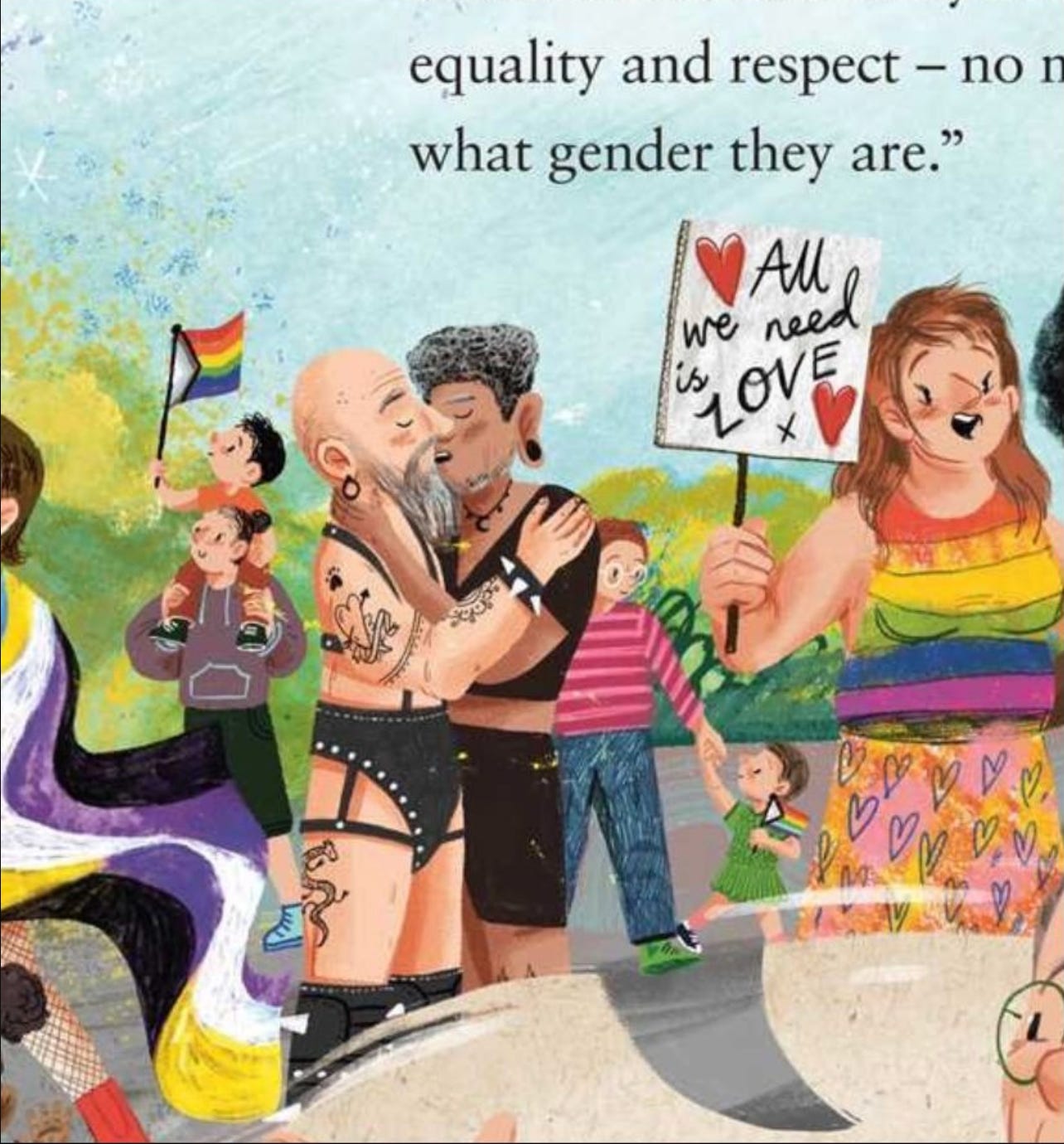(I’ve included a number of links to Twitter in this post. I hope they work. Twitter is currently blocking links from Substack).
I’ve been struggling with this post for days, feeling compelled to write it but finding it impossible to write. Here it is, posted with trepidation but without apology.
It’s Pride Month and I’m spending a few days in Bristol, enjoying some solitude and time out in this trendsetting city where we lived for more than thirty years and where our four children grew up. I’m enjoying the ways in which the old-fashioned version of Pride is a way of life here, with people of all ages, identities, and genders out on the streets enjoying the sunshine.
But I’m increasingly troubled by what Pride has become. There’s a dangerous naivety in some of its claims, which leads me to wonder what powerful corporate forces are benefitting from this expansive, no-holds-barred lovefest, and what hidden agendas it might inadvertently be promoting.
This morning Twitter was buzzing with tweets about Oxfam’s caricature of J.K. Rowling and the racist overtones of its LGBTQIA+ promotional video:
Oxfam later withdrew the video and reposted an edited version, with this message:
Meanwhile on TikTok, here’s what Oxfam has to say. This is full-blown neoliberal appropriation of causes, bodies, and conspicuous consumption.
In a world in which the abyss between rich and poor has rarely been wider, when children are starving while the rich buy yachts and private jets, when wars are depriving human beings of the most basic essentials while the arms dealers prosper, when refugees are being imprisoned in barges and British politics have become a toxic brew of nationalism and neoliberal extremism, what is Oxfam playing at? And this is the most politicised of issues, so what about that law that charities can’t be political?
The British Library has adopted the LGBTQIA+ flag as its Twitter profile, accompanied by a quote from Jeanette Winterson. I’ll say more about that later:
Elsewhere, I happened upon a thread that suggested a book for young children called Grandad’s Pride was secretly promoting paedophiles (who prefer now to call themselves Minor Attracted Persons—MAPs):
I don’t know enough about the symbols and secrets of these groups to know whether or not this thread is credible, but it backs up its claims fairly persuasively.
What concerns me isn’t the suggestion that small children might inadvertently be exposed to hidden codes that only a small minority of adults would know how to interpret (if indeed that is the case), but the message to young children that all love is good love, and all people who express love can be embraced and welcomed. I call this grooming:
It’s also worth drawing attention to an editorial difference between the US and UK versions of the book—which the above tweet points out. The guy in bondage gear in the above illustration from the UK version has been toned down. Here’s the US version:
And on another page, there’s a depiction of a body with double mastectomy scars:
This is, remember, a multi-award winning book that’s advertised for 4-7-year-olds.
Even if we overlook the disturbing illustrations, what is being denied here is the extent to which children are at risk of abuse, especially by adults who claim that the abuse must be understood as an expression of love. Let’s reflect on these words:
“What’s Pride?” I ask.
“Pride is like a giant party where we celebrate the wonderful diversity of our communities, and share the message that everybody should be treated with equality and respect—no matter who they love or what gender they are.”
How is a little child to understand this, especially if that child is at risk of abuse—as countless millions are, by family members, friends, priests, teachers, and pornographers—the vast majority of whom are men, including some who claim to be women?
Before anybody suggests I’m lending support to rightwing ideologues, let me make clear that I’m vigorously opposed to the hijacking of this issue by political and religious bigots cynically seizing an opportunity to promote their toxic ideologies by demonizing all who fail to conform to their rigid gender stereotypes. They care nothing for women’s rights or children’s rights. They are simply opportunists who will embrace any cause to consolidate their power. The way to resist them is to insist on the sexual rights of all mutually consenting adults—lesbian and gay as well as heterosexual—while fully embracing a feminist critique of their patriarchal power games.
The destructive idea that gender nonconformity constitutes a mismatch between the body and the real self is shared by conservatives and trans activists alike. In the former, a person’s character (usually a woman’s) is forced by social and religious pressures to conform to a narrow and suffocating essentialist ideal designed to maintain the patriarchal status quo with its macho men and feminine gals. In the latter, a person’s body is surgically and hormonally manipulated to conform to the fiction (Kathleen Stock) of being the right sex in the wrong body. Both are destructive of human creativity and diversity when it comes to gender. On an episode of the BBC medical soap opera Casualty this week, the characters celebrated one of them having “top surgery”—i.e. a double mastectomy—with a boob cake. The trans character says, “I’m glad I’ll finally look like the person that I feel like on the inside.” When a society tells a woman that having a double mastectomy is a way to feel more authentic, then please count me out of the cult.
Gender fluidity is a creative and playful aspect of what it means to be human, which we should all be free to experiment with at any stage and age in life without being told we need to mutilate our bodies to be real. Let little girls and boys cross-dress. Let confused adolescents try out different pronouns and personae, different names and identities. Set people free from the tyranny of gender stereotypes that condemn all feminine men and non-feminine women to a lifetime of abuse and subtle or not-so-subtle exclusion from their gendered tribes.
And let’s be clear that sex, gender, and love are not conflatable. Not every sexual relationship is loving, not every loving relationship is sexual, and gender has many functions that are not about sex. All kinship relationships are gendered, and there are good reasons why these gendered relationships are surrounded by sexual taboos. We breach those taboos at our peril. To tell a little child that they must love everybody irrespective of who they are, is also to imply that they must love everybody irrespective of what age they are, and to associate such love with guys in bondage gear is abusive. To suggest that grandfatherly figures are always benign and loving in the context of this advocacy of trans inclusivity is to ignore the abundant evidence that older men often pose a significant risk to children. My first but not my last experience of abuse was of being groped by an old man in a cinema when I was ten. I’m sure thousands of women can tell similar stories.
A phobia is an irrational fear. To seek to protect vulnerable adults and children from sexual predation is not phobic—it is a rational fear that has urgent ethical imperatives. Extreme child abuse fuelled by the pornography industry is spiralling out of control, including young children being groomed to perform sex acts in front of cameras. Opportunities for all forms of domestic abuse and violence proliferated during lockdown, with a backlog in the courts meaning that victims can wait years for justice. In some cases, justice never comes. I’ve just listened to the BBC podcast about Vishal Mehrotra, an 8 year-old Indian boy who was abducted on the day that Prince Charles and Diana were married, and whose remains were later found while the men who were in all likelihood responsible for his abduction and murder were never fully investigated. Pray if your child ever goes missing that it is a white-skinned, blonde-haired child who will make headline news for years after her disappearance.
What puzzles me is why so many gay and lesbian activists are going along with this cult, allowing their rainbow colours and hardwon rights to be appropriated in ways that dissolve all relationships into a sludge of sexual desires and confused identities that have deeply worrying associations and implications. Sexual love between consenting adults can be wonderful and it can be confusing, painful, part of life’s messy struggle to give and receive love. But when sexual desire becomes commodified, unleashed, and celebrated as something unambiguously good and healthy for all, including small children, we are going down a very, very dark path, especially when it presents itself as love—as it nearly always does in situations of grooming.
I’m a married woman with four adult children and four young grandchildren. I align myself unreservedly with those brave lesbians and feminists who fearlessly speak out, because they too are at risk of this new cult. Every lesbian I speak to, including young women who never speak out publicly for fear of being ostracised, is aware of the risk of male predators posing as trans women. I wonder why relatively few gay men are willing to take a stand on this. Is it perhaps because women remain the primary custodians and caretakers of children, and many men just don’t get it? Whether in the Catholic Church or in the field of trans activism, when you accommodate cultures in which male desires and drives take priority over all other considerations, when women who refuse to collude or cooperate are banished, children will be the first victims of sexual predation.
Let’s look at that British Library tweet again in the context of this:
What is the British Library playing at—that world-renowned repository of human wisdom gathered together in books that hold all we know about love and its struggles?
Juxtapose that British Library quote with that book for very young children, depicting adults in various sexualised situations, celebrating love in all its forms. It is not love that today is demanding expression, refusing to stay still, stay silent, be good, be modest. It is something that hides itself within the language of love. Jimmy Savile “loved” children. So did Rolf Harris.
I could go on and on, but it’s time to come out firmly, unambiguously and vocally on the side of children’s rights, including the right to adult love, protection, and responsibility for their well-being. They are the most vulnerable, the most abused, the most trusting, and their vulnerability should never be compromised by the narcissistic demands of a sexual cult. So I’m saying no to what Pride has become, and I wish all LGB people would say the same. Even if they all keep quiet, we older women—hags, grandmas, lesbians, whatever—are not easily silenced. There’s an age and a stage in life when we have little to lose personally, and everything to lose in the lives of those we feel most called to love and protect. We know what love is—its cost, its vulnerability, its trust, its betrayal.
I refused to be silenced by the men of the Church when I stood up in defence of same-sex marriage, and I remain committed to defending the principle that same-sex relationships are entitled to all the protections and entitlements—and yes, the responsibilities—of heterosexual relationships. But I cannot accept what Pride has become, and I cannot keep quiet. How to lose friends and stop influencing people? Maybe, but that’s a risk I’m willing to take.
What I feel really conflicted and uncertain about is the hurt that I know this post will cause to trans friends who have trusted me with their stories and their vulnerabilities. In the end, I’ve had to make a choice. One of them I know will be supportive of this. I wish others were more willing to acknowledge some of the difficulties I’m highlighting here, but I’ve had to make a very difficult choice about who to support, and why. This post is the choice I’ve made.













I have to agree Tina and I’m alarmed at the viciousness which is often involved if one dares to be even slightly non-condemnatory of people like J K Rowling.
Thank you Tina for sharing your reflections and having the courage to take the stand you have. I share your concerns about the details and graphics in the publication Grandad's Pride and I too am suspicious of what is driving this. I am also concerned about the Oxfam TikTok posting. And yet I am conflicted to some degree as parents will say the would indeed want to teach their children that "everybody should be treated with equality and respect—no matter who they love or what gender they are" as stated in the What is Pride answer in the book. Similarly as Christians we hold as central the teachings of Jesus on the two great commandments to love God and love others as yourself, and his final discourse that repeats his new commandment of love that is to be applied to everyone. On the face of it, Jeanette Winterson's statement is enormously empowering, especially perhaps for those of us in same sex relationships who time and again, in Church and secular settings, have had to keep quiet. Knowing that love will not stay silent affirms and ratifies and enables us to dare speak the name of our love. And yet you are right in all you say about the dangers of sexualisation, grooming and exploitation that run as undercurrents in the examples you denounce. Somehow we need to discern how to proclaim values that are key to our faith and our identity, while distinguishing and separating these from the disturbing trend you describe so clearly.